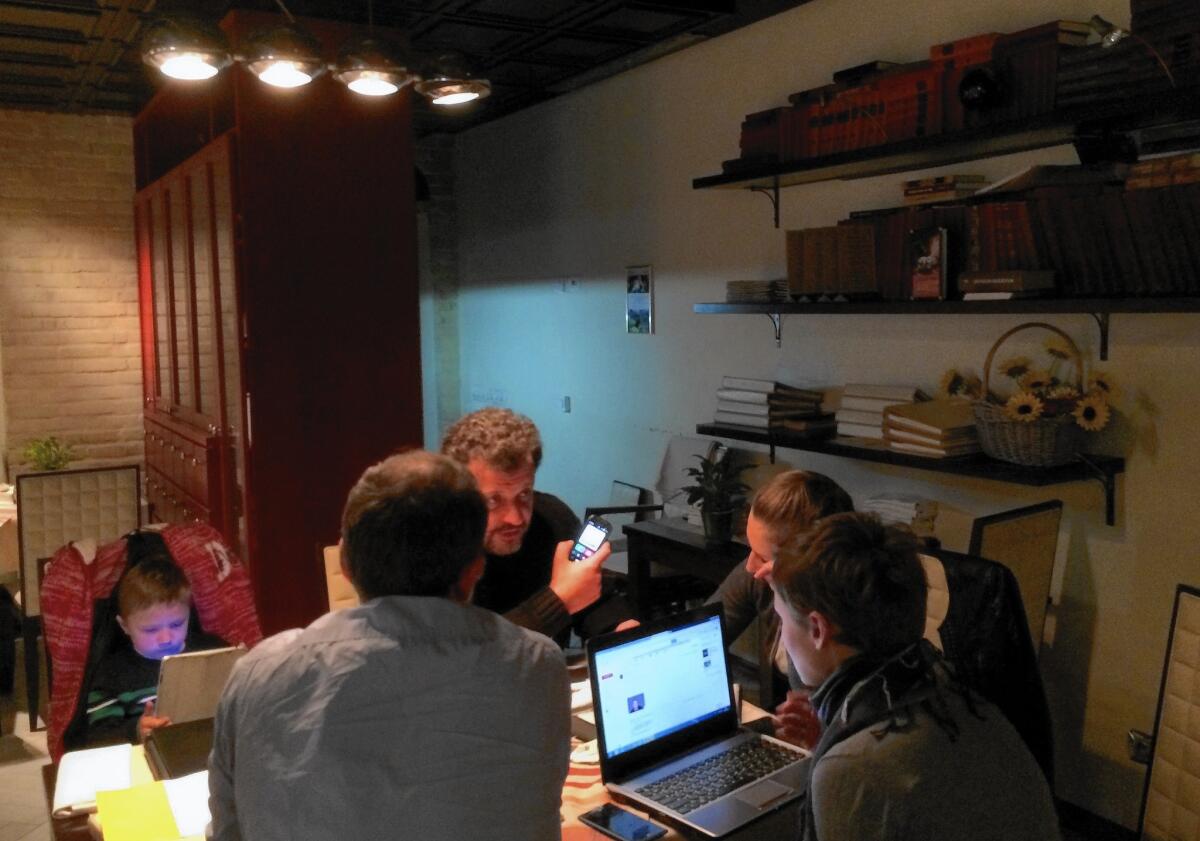In Kharkiv, Ukraine, a cafe is an unlikely war room

- Share via
Reporting from Kharkiv, Ukraine — Irina Korosteleva bustles into the KoKave coffee shop like a student late for class, her 5-year-old son Gardei in tow. She takes off the youngster’s quilted jacket, parks him on a chair with a cellphone video game and takes her seat among fellow defenders of Ukraine, their laptops crowding out saucers and sugar bowls.
The upscale cafe is an unlikely war room. Russian-language volumes of Jules Verne and Boris Pasternak line the walls. Soft background music darts from baroque classics to Rod Stewart. An endless stream of cappuccinos and herbal infusions are delivered to the stalwarts of the Kharkiv Civic Forum as they organize relief for their occupied neighbors, between dashes to the freezing courtyard for a smoke.
The forum unites alumni of the hard-fought triumph over Russia’s proxies who made a failed attempt to include the Kharkiv region in their proclaimed “peoples’ republics” — the Donetsk and Luhansk territory they have occupied since April.
Dmytro Kutovyi, a burly man with a shock of curly hair, attempts to focus the coterie of peace activists, nationalist fighters and refugees from the neighboring territory in the grip of pro-Russia separatists. He grills them on the search for shelter for 150,000-plus refugees, on efforts to collect supplies for soldiers hunkered down for winter, and on strategies for continuing to keep the separatists out of Ukraine’s second-largest city, home to 1.4 million people.
“They didn’t count on 40,000 people marching down Moskovsky Prospekt in demand of Ukrainian independence,” Kutovyi says of the gunmen forced to make a rare retreat.
A few blocks away, in a cobblestone square that was once a rallying point for pro-Russia pensioners and communists, stands a symbol of the end of Russian domination. All that is left of the Freedom Square statue of Soviet founder Vladimir Lenin is a four-story-high plinth and the Communist leader’s right boot, from which the blue-and-yellow flag of independent Ukraine now flutters.
The dead-of-night toppling of the statue a month ago demonstrated Kharkiv residents’ steadfast opposition to any new era of Kremlin subjugation. So does a tent at the head of the square, where volunteers distribute donated blankets, wool pants and mattresses brought by Kharkiv citizens for front-line fighters.
But not all in the cafe or square are as optimistic as Kutovyi. Korosteleva, for one, reports that opposition to the separatists has collapsed in her home town, Luhansk.
“No one is even trying to mount a resistance now. It would be suicide,” says the young mother with a thick blond braid and milkmaid complexion. “The gunmen filmed our demonstrations. They have a hit list.”
Korosteleva fled with her son in May, after the energy company building where she worked was destroyed by an artillery shell and gunmen from Russia turned increasingly violent. She recalls an encounter with a masked gunman enraged by an American flag logo on her shirt.
“He stuck the nose of his rifle into the car window and screamed, ‘There is no Ukraine!’” Korosteleva recalled, patting her chest to mimic the heart palpitations induced by the confrontation.
With her husband safely away in government-controlled Zaporizhia repairing rocket launchers for Ukrainian troops, Korosteleva spends her days collecting clothing for the destitute displaced, who, unlike herself, have to rely on the largesse of the people of Kharkiv. The hosts have their own worries in a region racked by unemployment and soaring prices. But they have been made generous by the dodged-bullet, “There but for the grace of God ...” feeling.
Olga Leonova, owner of the Kaname Salon near the cafe, has given work to hairdressers forced to flee the eastern fighting.
“They’re not refugees,” insists Leonova. “They are temporarily displaced, and they need to work and keep as normal a life as possible in this madness.”
Forum volunteers acknowledge help from officials in the Ukrainian capital, Kiev, but see the shake-off of the pro-Russia gunmen as the product of their defiance.
Natasha Kurdyukova, a documentary filmmaker before her country was engulfed in turmoil, is another regular in the frenetic daily coffee klatsch at KoKave. On a bitterly cold afternoon in late October, she darted off with Volodya — surname undisclosed, even to his closest comrades — to deliver relief.
Volodya swerves his SUV with the cracked windshield and overflowing ashtray through Kharkiv’s busy streets like a man who believes death awaits him. On a break from the Donetsk front, he runs equipment out to the Ramoshka camp where 110 souls languish at a long-abandoned children’s summer camp.
At open-air picnic tables where food is doled out, Irina Filemonova wraps a plaid wool blanket around her waist against a cold wind fluttering dead leaves on a day that never warms above 25 degrees.
“The regional government has no money,” she says, showing visitors fresh wooden studs marking out rooms intended to be showers and toilets. “All we can do is hope it comes from somewhere.”
More to Read
Sign up for Essential California
The most important California stories and recommendations in your inbox every morning.
You may occasionally receive promotional content from the Los Angeles Times.











